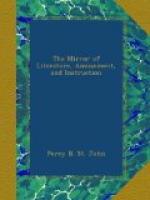“At Lucca, I had always to direct the opera when the reigning family visited the theatre; I played three times a week at the court, and every fortnight superintended the arrangement of a grand concert for the court parties, which, however, the reigning princess, Elisa Bacciochi Princess of Lucca and Piombino, Napoleon’s favourite sister, was not always present at, or did not hear to the close, as the harmonic tones of my violin were apt to grate her nerves, but there never failed to be present another much esteemed lady, who, while I had long admired her, bore (at least so I imagined) a reciprocal feeling towards me. Our passion gradually increased; and as it was necessary to keep it concealed, the footing on which we stood with each other became in consequence the more interesting. One day I promised to surprise her with a musical jeu d’esprit, which should have a reference to our mutual attachment. I accordingly announced for performance a comic novelty, to which I gave the name of ‘Love Scene.’ All were curiously impatient to know what this should turn out to be, when at last I appeared with my violin, from which I had taken off the two middle strings, leaving only the E and the G string. By the first of these I proposed to represent the lady, by the other the gentleman; and I proceeded to play a sort of dialogue, in which I attempted to delineate the capricious quarrels and reconciliations of lovers—at one time scolding each other, at another sighing and making tender advances, renewing their professions of love and esteem, and finally winding up the scene in the utmost good humour and delight. Having at last brought them into a state of the most perfect harmony, the united pair lead off a pas de deux, concluding with a brilliant finale. This musical scena went off with much eclat. The lady, who understood the whole perfectly, rewarded me with her gracious looks; the princess was all kindness, overwhelmed me with applause, and, after complimenting me upon what I had been able to effect upon the two strings, expressed a wish to hear what I could execute upon one string. I immediately assented—the idea caught my fancy; and as the emperor’s birthday took place a. few weeks afterwards, I composed my Sonata ‘Napoleon’ for the G. string, and performed it upon that day before the court with so much approbation that a cantata of Cimarosa, following immediately alter it upon the same evening, was completely extinguished, and produced no effect whatever. This is the first and true cause of my partiality for the G. string; and as they were always desiring to hear more of it, one day taught another, until at last my proficiency in this department was completely established.”




